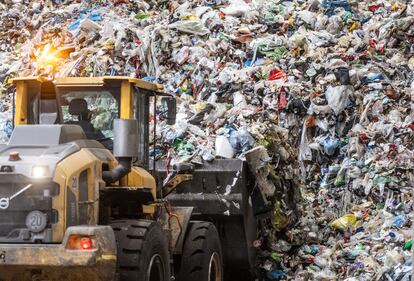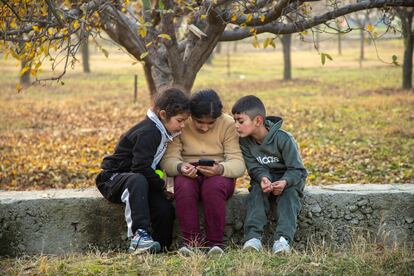Six key questions for 2024
How these questions are answered will determine whether new crises or opportunities present themselves this year

How will the post-war scenario (if there even is one) be managed in Gaza and Ukraine? Will we finally regulate device usage among children under the age of 16? Can anything stop Trump from returning to the White House? Will we be able to build general artificial intelligence? Will we make sustainable habits a trend? Will cities become liveable and affordable again? These are just some of the major questions that will be the subject of debate in 2024.
How will the post-war scenario (if there even is one) be managed in Gaza and Ukraine?

The cruelty of the war in both Gaza and Ukraine forces us to plan for a future in which hostilities cease, even if that horizon doesn’t seem imminent. In Gaza, Israel’s offensive has already lasted three months. In Ukraine, the invasion unleashed by Russia will soon be two-years-old. While the world — and particularly the West — claim to be seeking peace, this hasn’t translated into any tangible solutions.
The post-war scenario in Ukraine will be of particular importance for the European Union (EU). The EU has linked its future to Kyiv’s by opening accession negotiations, a process that’s been activated for the first time when a prospective member is being invaded. This is a gesture of enormous significance, adopted at the last European summit in 2023. Since then, Ukraine has — legitimately and legally speaking — the hope of one day joining the bloc, which currently consists of 27 member states.
The EU will have to get involved — offering money and demanding reforms — to rebuild a devastated country. At the same time, the bloc must undertake an internal transformation that will allow it to absorb a territory larger than any of those that now make up the European family.
Meanwhile, in Gaza, the political leadership is outlining the future of the Strip after the bombs stop being dropped by Israel. The United States is the main actor in this process. The Biden administration is already outlining — so far without success — what type of authority should govern the Palestinian enclave once the Israeli bombardment ends. But the EU must not remain detached from these efforts. The EU is the main provider of external assistance to Palestine in general and Gaza in particular. Its role cannot be limited to rebuilding schools until the next Israeli offensive simply reduces them to rubble. By Lucía Abellán.
Can anything stop Trump from returning to the White House?

With 10 months to go before the 2024 U.S. presidential elections, Donald Trump is moving towards the White House like a runaway freight train. Prosecutors, judges and political rivals are trying (unsuccessfully) to apply their emergency brakes. However, at the moment, none of his opponents seem capable of stopping his aspiration to obtain the Republican nomination and get a rematch with Joe Biden.
Trump has several legal troubles, with 91 charges across four criminal cases. He will be put on trial for allegedly attempting to subvert the legitimate 2020 election result, for his role in the assault on the Capitol on January 6, 2021, for his handling of the secret documents he took (without permission) when he left office to his Florida home, as well as for alleged hush money payments he made in 2016 to a pornographic actress to keep her quiet about an extramarital relationship. Still, even if he were to be found guilty of any of these crimes, sentencing wouldn’t prevent him from contesting the presidency, even from a jail cell.
A provision of the U.S. Constitution (Section 3 of the 14th Amendment) prevents participants in an insurrection from running for public office. Two states — Colorado and Maine ― have decided that this prohibition can be applied to him. Still, the last word will surely come from the Supreme Court, which has a conservative supermajority. In fact, three of the judges were appointed by Trump. It seems unlikely that they will disqualify him.
Every time a new emergency brake is activated, Trump gains sympathizers among those who believe that the attempts to stop his candidacy are due to political persecution. So, 10 months before the election, there may only be one answer to the question about what could prevent Trump from colliding with the White House: voters. By Iker Seisdedos.
Will big cities become affordable and liveable again?

According to the United Nations, 80% of the world’s population will live in cities by 2050. Yet, these metropolises suffer from serious problems related to gentrification, mass tourism, sprawl, or segregation between rich and poor residents. The city runs the risk of losing its status as a place of coexistence, where the great ideas of humanity are born. Rather, cities are becoming products that compete in the global market, trying to attract flows of tourism and investment at any cost.
Luxury consumption, spectacular culture, major sporting events, professional conferences, concerts, avant-garde gastronomy, sparkling nightlife, shopping, tourism, or the most striking Christmas lighting are some of the attractions that cities strive to offer. Such a model thinks more about the exterior than the interior, forgetting about the residents in the process.
Housing has been converted into an investment rather than a right, with skyrocketing prices pressured by speculation and short-term rentals. In many mega-cities, segments of the population have been expelled to make way for tourists, resulting in the emptying of urban centers. They’ve become papier-mâché scenarios for the practice of commerce and tourism… much-vaunted theme parks.
There’s a certain theoretical consensus on the need for greener and more sustainable cities — cities that are more livable, where inequalities are eliminated and the focus is placed on the residents. One such model is the 15-minute city, where human beings and their daily routines are placed at the center of urban development. The U.N. Sustainable Development Goals say so: cities must be “inclusive, safe, resilient and sustainable.” The U.N.’s New Urban Agenda sets out to achieve this in the coming years. However, despite the professed consensus, the political will is lacking. By Sergio C. Fanjul.
Will sustainable habits become the norm?

In 2019, Greta Thunberg wrote on Instagram: “Change is coming, whether you like it or not.” Some supporters of the obsolete world of fossil fuels — such as Donald Trump — laughed this off. But time seems to be proving the young Swedish woman right, with more and more people changing their daily habits. In Spain, for instance, eight out of 10 people separate waste from recycling in their homes, while 75% of young people take sustainability into account while doing their shopping. In Western Europe, the presence of transportation that pollutes less — such as trains, trams, buses, bicycles and electric cars — has increased, with more electricity being generated by renewable sources.
In another change, the so-called “circular economy” — which, just a few years ago seemed like something for hippies — is now recommended by The Economist or Cisco. Major finance companies such as MSCI say that, in 2024, sustainability is an imperative need and also a business opportunity. “The pace of this transition will be slower than sustainability advocates wish, but the inevitability of this change is reaching market scale,” a GreenBiz report concludes.”It’s perceived that citizens are increasingly aware of the need to move towards sustainability,” explains José Manuel Gutiérrez, an expert on climate change at the Spanish National Research Council.
The bad news is that we’re moving too slowly. “It’s as if we’re [burning] in the oven and, as the temperature rises little by little, we don’t realize it,” Gutiérrez warns. Oil, coal, natural gas and rampant consumerism are leading us to climate collapse. All of us — states, companies, citizens — have to get involved to change course. As explorer Robert Swan says, the greatest threat to our planet is the belief that someone else will save it. By Mar Padilla.
Will we regulate device usage among those who are under the age of 16?

It was once said that they were digital natives, that their brains would develop differently and that, thanks to multitasking, they would be able to process information through digital media even more efficiently than with paper.
The fever for the technological race led countless families to give mobile phones to their children at an early age, without paying attention to the possible damage this would cause. Schools also opened their doors to new devices: it seemed like a good option to use a personal smartphone in class to solve math problems. Nowadays, however, the competition is the other way around: the lack of limitations around technology, the lack of protection of minors and the abusive consumption of social media and porn websites have led families, institutions and schools to look for ways to reduce screen time.
Beyond the examples of countries such as the United Kingdom and France — which have approved regulations to limit device usage in schools — Sweden is one of the most extreme cases. It has frozen its digitalization plan in schools to promote textbooks. Meanwhile, the Spanish Ministry of Education has proposed prohibiting mobile phone access in classrooms.
According to UNESCO, having your phone on the desk during a lesson and receiving a notification can cause a 20-minute-long distraction for the student, which is how long it takes to regain their attention. The Spanish Data Protection Agency has designed an efficient age verification tool to show technology companies how to address this. In a high-income country such as Spain — where seven out of 10 children between the ages of 10 and 15 have mobile phones — the most difficult battle is fought in the household: 60% of adolescents don’t have rules at home regarding the use of digital devices. By Ana Torres Menárguez.
Will we build general artificial intelligence?

Artificial intelligence (AI) can become an assistant that will make our lives easier. Or, it could be a tool that will replace us and leave us without work.
However, companies such as OpenAI aren’t satisfied with AI as it currently is. Their goal is to program general artificial intelligence — that is, a conscious program that thinks like humans. This would be the first step towards superintelligence, which could become the key to solving all problems, including death. Or, on the contrary, it could represent the end of our existence.
These companies don’t have an easy path forward: we still don’t know how to define consciousness or intelligence. And there’s a lot we don’t know about how the brain works. Building AI is like when, in the Middle Ages, illustrators tried to draw animals they had never seen before. Their elephants ended up looking like boars.
Furthermore, while AI has achieved success in very complex environments, this has happened in spaces with clear rules, such as chess. On the other hand, it has more difficulties when it comes to open and unpredictable environments, such as autonomous driving. General artificial intelligence must be able to deal with millions of factors that are very difficult to predict and, often, with rules that aren’t always respected.
AI also doesn’t do very well when it depends too much on the material it has been fed. It shows biases, plagiarizes illustrators and reveals programming dependencies. If ChatGPT doesn’t know what to say, it invents things, because it’s designed to generate content no matter what. It’s difficult to think that a kind of human intelligence will emerge from this… unless it’s a botched, limited and prejudiced intelligence. Of course, this cannot be ruled out, nor is it far removed from what we’re familiar with.
AI can be a useful tool. Or a threat. Or both. But general AI may be an unattainable goal. What’s likely, however, is that a human being will dare to say that they’ve achieved it… even if it’s a lie. By Jaime Rubio Hancock.
Sign up for our weekly newsletter to get more English-language news coverage from EL PAÍS USA Edition










































